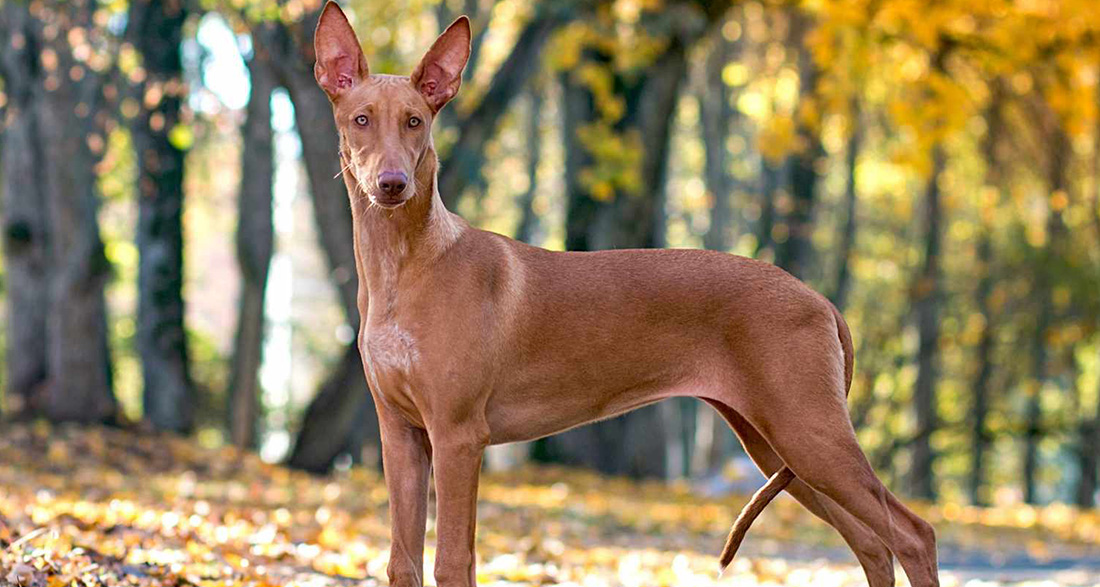When it comes to dog breeds, there is a wide variety to choose from. An interesting and fascinating breed we’d like to talk about today is the Pharaoh Hound. With its elegant appearance and a history dating back to ancient Egypt, the Pharaoh Hound is a favorite among dog enthusiasts. In this article, we will delve into this unique breed, exploring its characteristics, traits, and care requirements.
History of the Pharaoh Hound
The exact origin and early history of the Pharaoh Hound are challenging to trace accurately. It is believed, however, that the breed has existed for millennia. The specific ancestral lineage leading to the Pharaoh Hound is unknown. Documentation of its development only began in the 20th century, with systematic breeding initiated by the British in the 1960s. The FCI (Fédération Cynologique Internationale) recognized the Pharaoh Hound in 1977 under a collective standard, and it was acknowledged as a distinct breed in 1991.
Breed Overview
GROUP: Hound
HEIGHT: 22 to 25 inches (males); 21 to 24 inches (females)
WEIGHT: 40 to 60 pounds
TEMPERAMENT: Intelligent, energetic, playful, affectionate, loyal
COAT: Short and glossy
COAT COLOR: Rich tan to chestnut, golden-red, or tan
HYPOALLERGENIC: No
LIFE SPAN: 11 to 14 years
Appearance
The Pharaoh Hound has a slender and muscular build. It is of medium size and reaches a shoulder height of around 53 to 63 centimetres. Their weight is usually between 18 and 27 kilograms. The coat of this breed is short, smooth and easy to care for. There are different color variations, including red, sand, cream and brindle. Some Pharaoh Hounds also have white markings on their chest and paws.
The Pharaoh Hound has an elegant head with almond-shaped eyes and alert ears. Their expression is intelligent and alert. The slender cheekbones and long muzzle give them a unique appearance.
Personality and Character
The Pharaoh Hound has a remarkable character marked by immense joy for life. Intelligent and affectionate, they take life as it comes and delight their human companions with clownish behaviors. While they may be somewhat aloof at times, they are generally gentle and get along well with others, including children and other dogs. They enjoy human company, seeking affection and attention while maintaining their independence. One of their most endearing traits is their ability to smile and blush. When happy or excited, a deep pink coloration can be observed on their nose and ears. Many owners even teach their Pharaoh Hounds to smile, a trick that is easily learned by this joyful breed.
Pharaoh Hounds are highly intelligent with a strong willingness to learn. They relish challenges and enjoy acquiring new skills. This breed requires mental stimulation and tasks to feel content.
| Affection Level | High |
| Friendliness | High |
| Kid-Friendly | High |
| Pet-Friendly | Medium |
| Exercise Needs | High |
| Playfulness | High |
| Energy Level | High |
| Trainability | Medium |
| Intelligence | High |
| Tendency to Bark | High |
| Amount of Shedding | Low |
Acquiring
If you decide to get a Pharaoh Hound, you should be aware that it is a rare breed and it may be difficult to find a reputable breeder. It is important to choose a responsible breeder who breeds healthy dogs and has the correct health checks. Do thorough research and look for reputable breeders who specialize in Pharaoh Hounds. Check their reputation, read reviews and make sure they breed responsibly.
Interviews and Adoption
Participate in interviews and meet potential puppies in person before making a final decision. Observe the behavior and health of the puppies and the conditions in which they were raised.
Alternatively, consider adopting a Pharaoh Hound from a shelter or rescue organization. Despite being a purebred dog, some Pharaoh Hounds may end up in shelters or rescue organizations. Adopting a dog is a wonderful way to give them a new home and a second chance.

What to Consider When Buying a Pharaoh Hound?
If you’ve identified a seller, make sure to ensure the following aspects:
- The breeding includes a pedigree to minimize the inbreeding rate.
- The parent animals are healthy.
- The puppies receive medical care.
- The living conditions are appropriate.
- You get to meet the puppies before the handover.
- The handover takes place not before the 12th week of life.
If you’re not purchasing the dog from a breeder but opting for a rescue dog from an animal shelter, you should inquire about the reasons for surrender. Some dog owners may struggle with the requirements of the breed, so be prepared for training deficiencies that require patience.
Development and Training of the Puppy
The Pharaoh Hound is traditionally used for hunting in its homeland, displaying keen senses focused on locating prey. While this makes them vigilant and able to concentrate well, their hunting interest can be a hindrance in training and everyday situations because they may not be responsive. Recall is a challenging endeavor for this breed, even with expert training; they may not reliably obey.
Nevertheless, the Pharaoh Hound possesses many qualities (affection, friendly demeanor, intelligence) that humans can strategically leverage. In summary, this breed is best suited for experienced handlers.
How to Care for a Pharaoh Hound?
In its homeland, the Pharaoh Hound is valued primarily for its hunting success. In different environments, they are more of a playful family companion than a hunter.
The ideal dog owner should be very athletic to align the dog’s needs with their lifestyle successfully. Adequate engagement can help temper their disposition indoors. Given their lack of an undercoat, constant outdoor keeping is not recommended. They should be indoors during mild temperatures and inclement weather.
It’s desirable for the new home to have an escape-proof garden. Due to their tendency to bark a lot, living in multi-family housing or urban areas might not always be tolerated. Ensure you live alone or discuss the acquisition with your neighbors.
Due to their hunting passion, there should be no small animals in the household. They generally get along well with other dogs, but occasional disputes may arise between males.
They exhibit reserved behavior with strangers but are generally fond of children.

Activities with the Pharaoh Hound
The Pharaoh Hound is a sports enthusiast requiring physical challenges. However, being a natural hunter, they may become highly focused on sight or scent stimuli, making it challenging to divert their attention. Therefore, choose enclosed areas or activities that the dog can do on a leash (such as cycling, jogging, and dog racing) for physical engagement.
The ideal dog owner should be active and sports-oriented, ensuring the Pharaoh Hound gets sufficient exercise while also allowing for proper rest and recovery.
Grooming
The short coat of the Pharaoh Hound requires minimal grooming effort. Regular brushing once a week is usually sufficient to remove loose hair and keep the coat shiny. Teeth should be cleaned regularly, and nails trimmed. Regularly check and clean the ears to prevent infections.
A balanced diet is crucial for the health of your Pharaoh Hound. Choose high-quality dog food that meets the nutritional needs of the breed. Pharaoh Hounds are energetic and require regular exercise and sufficient space for running and playing.
Health and Genetic Diseases
Pharaoh Hounds are generally healthy dogs, but like all breeds, they are susceptible to certain genetic diseases. The most common health issues in Pharaoh Hounds include hip dysplasia, elbow dysplasia, and eye diseases. It’s essential for breeders to test their dogs for these conditions and use only healthy dogs for breeding. If you’re buying a Pharaoh Hound puppy, make sure the parents have been tested for these diseases.
Regular veterinary visits should be part of Pharaoh Hound care. Vaccinations, deworming, and health checks should be performed according to the vet’s recommendations to detect and treat potential health issues early.
Interesting and Fun Facts
Here are some exciting additional facts:
- The Pharaoh Hound is one of the oldest domesticated purebred dogs, existing for around 3000 years. It even has its own hieroglyphs in the Egyptian alphabet.
- Although it’s not entirely clear whether the Pharaoh Hound originates from Malta or Egypt, it has been named Malta’s national dog.
- When a Pharaoh Hound is excited, you can see it in their red ears and nose.
Do you have a Pharaoh Hound or are you considering getting one? Share with us in the comments what you think makes them special!


